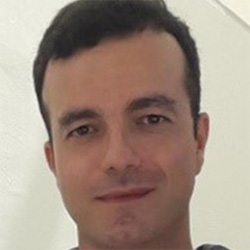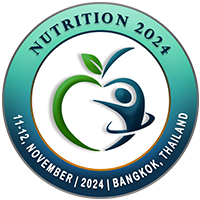
Gabriele Angelico
Institute of Umbria, ItalyTitle: Time course of bdellovibrio bacteriovorus and escherichia coli on milk
Abstract
We tested the predation of B. bacteriovorus against E. coli in milk samples by three different experiments. In experiment 1 the growth and predatory activity of B. bacteriovorus against E.coli in milk stored at 4°C was evaluated. In experiment 2 the predatory activity of B. bacteriovorus against E.coli in the milk matrix was compared to the optimal one in the medium of choice. In experiment 3 the influence of the native milk microbial community on the predation of B. bacteriovorus against E. coli experimentally added or indigenous at 4°C was tested. The predator increased at 4°C by about 1 Log in the first 48 hours and caused E. coli decrease by about 2 Log after 24 hours. However, the predator at 30°C reduced E. coli more (3 Log) and faster (at 6 h) than at 4°C (2 Log at 24 hours). B. bacteriovorus at 30°C preyed on E. coli more in the nutrient broth than in the milk, with the most significant difference by about 4 Log after 48 hours. In raw milk contaminated only by the predator, it increased by about 1 Log after 48 hours at 4°C, suggesting that it preyed on indigenous microorganisms. B. bacteriovorus could find application in raw milk used as food or raw material during storage at 4°C to reduce the microbial load of spoilage and STEC strains of E.coli and therefore increase its shelf-life and healthiness.
Biography
Gabriele Angelico has completed his study in animal health and hygiene at University of Camerino, Italy. He is a researcher at Istituto Zooprofilattico Sperimentale dell’Umbria e delle Marche “Togo Rosati” in Ancona, Italy. Currently he is working at finalized research of the Italian Ministry of Health Microplastics with a project on edible aquatic organisms: ecotoxicological effects, transfer of chemical and biological contaminants and susceptibility to bacteria biodegradation. Since the last 10 years he has gained experience in microbiological monitoring of sanitary status in live bivalve molluscs using biomarkers, Halobacteriovorax (Bdellovibrio and like organisms) and molecular biology techniques; analysis and control of parasitic infections in live bivalve molluscs; entomological sampling and morphological identification of arthropods, monitoring of vector-borne disease with direct, serological and molecular diagnosis; diagnosis and monitoring of zoonoses; laboratory analysis for food borne disease.

